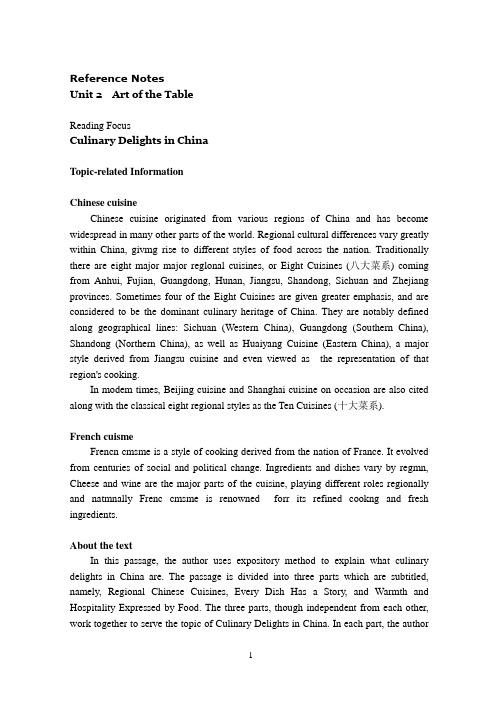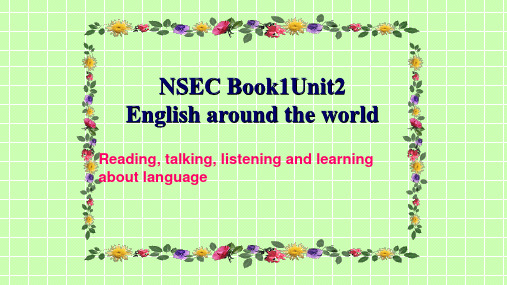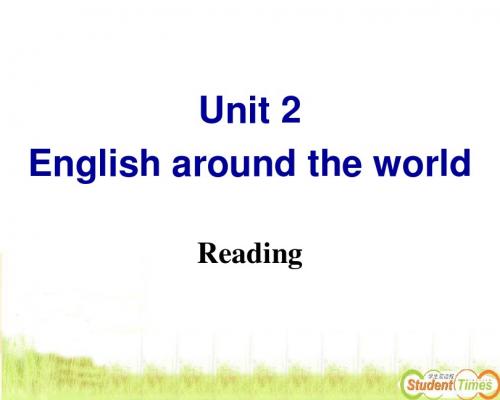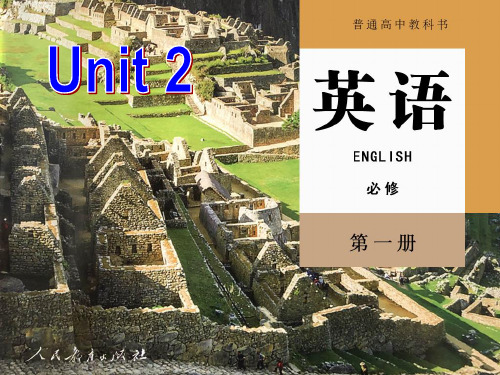book1unit2Reading
- 格式:ppt
- 大小:1.11 MB
- 文档页数:18



Reference NotesUnit 2 Art of the TableReading FocusCulinary Delights in ChinaTopic-related InformationChinese cuisineChinese cuisine originated from various regions of China and has become widespread in many other parts of the world. Regional cultural differences vary greatly within China, givmg rise to different styles of food across the nation. Traditionally there are eight major major reglonal cuisines, or Eight Cuisines (八大菜系) coming from Anhui, Fujian, Guangdong, Hunan, Jiangsu, Shandong, Sichuan and Zhejiang provinces. Sometimes four of the Eight Cuisines are given greater emphasis, and are considered to be the dominant culinary heritage of China. They are notably defined along geographical lines: Sichuan (Western China), Guangdong (Southern China), Shandong (Northern China), as well as Huaiyang Cuisine (Eastern China), a major style derived from Jiangsu cuisine and even viewed as the representation of that region's cooking.In modem times, Beijing cuisine and Shanghai cuisine on occasion are also cited along with the classical eight regional styles as the Ten Cuisines (十大菜系).French cuismeFrencn cmsme is a style of cooking derived from the nation of France. It evolved from centuries of social and political change. Ingredients and dishes vary by regmn, Cheese and wine are the major parts of the cuisine, playing different roles regionally and natmnally Frenc cmsme is renowned forr its refined cookng and fresh ingredients.About the textIn this passage, the author uses expository method to explain what culinary delights in China are. The passage is divided into three parts which are subtitled, namely, Regional Chinese Cuisines, Every Dish Has a Story, and Warmth and Hospitality Expressed by Food. The three parts, though independent from each other, work together to serve the topic of Culinary Delights in China. In each part, the authoruses vivid details to support the main idea.The author uses very specific and vivid words, interesting stories as well as a touch of humor when trying to represent the culinary delights. On the whole, the passage provides us acheerful and witty reading.参考译文中餐被公认为全球最佳美食之一,其种类之丰富,工艺之繁复,使其理所当然地成为游客大快朵颐的乐事之一。




Goodmorning,teachers.It’smygreathonortobeheresharingmy lessonwithyou.ThecontentofmylessonisSeniorEnglishBook1Unit2’sReading.I’llbereadytobeginthislessonfrom4parts:Analysis oftheteachingmaterial,theteachingmethods,thestudentsandstud yingmethods,theteachingprocedure.First,letmetalkaboutthetea chingmaterial.PartⅠ?The?analysis?of?the?teaching?material??1.?Analysis?of?the?position?of?the?lesson?The?central?topic?of?this?unit?is?“English?around?the? world".?This?unit?seeks?to?give?students?a?better?understan ding?of?how?English?developed?and?how?it?is?spoken?in?the?w orld.?Students?often?hear?talk?about?“standard?English”.?In?fact,?as?this?unit ?hopes?to?make?clear,?there?is?no?such?thing?as?one?standar d?of?spoken?or?written?English.?English?is?spoken?in?many?c ountries?throughout?the?world?and?many?of?them?have?differe nt?forms?of?expression.?This?lesson?aims?to?open?a?window? for?students?to?learn?English?and?to?understand?the?develop ing?trend?of?language.?2.Teaching?AimsAccordingtothenewstandardcurriculumandthesyllabus,andaf terstudyingtheteachingmaterial,theteachingaimsarethefollowi ng:1.Knowledgeaims:1)Learn?the?new?words?in?this?passage.?2)The?student?will?know?the?developing?trend?of?English?in? the?world.?Will?learn?the?difference?between?BE?and?AE.3)Learn?to?deal?with?difficulties?in?language?communication ?4)Master?the?expression?of?direct?speech?and?indirect?speec h?of?request?and?demand2Abilityaims:1)To?develop?the?students’?reading?ability,?learn?to?use?s ome?reading?strategies?such?asskimming?and?scanning;2)To?encourage?students?speakEnglish.3Emotionalaims:1)ToknowthedifferencesbetweenBritishEnglishandAmericanEngli sh,throughitslearningto increase?the?students’?interest?in? learning?English.2)B roaden?the?students’?international?mind?and?understand? the?cultural?diversity.?And?gradually?form?the?consciousness?of?cross?culture?communication,?whic h?will?be?the?basis?for?learning?Chinese?and?Western?culture.3)To?cultivate?students’?abili ty?to?cooperate?with?each?ot her.3.TeachingKeys&DifficultiesKeypoints:1)Letstudentsmasternewwordsandphrasesinthepassage.2)Developstudents’readingability,especiallysummarizing,?sk imming?and?scanning?ability.3)Throughcooperation,cultivatetheircommunicationability. DifficultpointsExpressingone’sideaonwhichkindofEnglishonesh ouldlearn;gues sthenameofspeaker’scountrybylistening;howtotellthedifferen cesbetweenacommandandarequest;howtochangethepronounwhenturn ingthedirectspeechintoindirectspeech.PartⅡ?Teaching?methodsAs?is?known?to?us?all,?a?good?teaching?method?requires? that?the?teacher?should?help?the?Ss?develop?good?sense?of?the?English?language.?For?achieving?t hese?teaching?aims,?I?will?use?the?following?methods?according?to?the?modern?social?communicat ion?teaching?theories.?(1)?Multi-media?teaching?(2)?Cooperative?learning-for?example:?group?discussion?(3)Task-Based?Language?Teaching:?for?example?role?playing?g ame?PartⅢ?Analysis?of?the?studentsandstudyingmethods?My?students?are?first-grade?students?of?senior?high?sch ool.?They?have?been?learning?English?in?junior?high?school?and?have?accumulated?a?certain?number ?of?vocabularies.?They?have?masteredsome?simple?learning?strategies?and?skills?with?a?prelimina ry?ability?of?speaking?and?writing.?Howev er,?the?differences?in?students’?personality?and?Engl ish?proficiency?are?very?large.?So?my?teaching?design?should?have?gradient?to?meet?the?need?of?di fferent?student.?As?for?learning,?Students?will?learn?through?independent?reading,?discussing ?and?cooperating.?PartⅣ?Teaching?procedures?(一)导入:首先在学生对英语是世界上最广泛使用的语言和越来越多的人在学习英语现有情况了解的基础上,引出问题:“Do?you?know?how?many?countries?use?English?as?their?mothe r?tongueDo?you?know?something?about?English?around?the?worl d?”在学生思索时,引出课题English?around?the?world。



Warming-up and reading课前预习I: Background Knowledge — HistoryOlympics1. When did the ancient Olympic Games start?A. 1896B. 1906C. 776 BC2.Where did the ancient Olympics start?A. RomeB. IndiaC. GreeceD. the U.S.A3. When and where did the modern Olympics start?A. 1896 OlympiaB. 1896 AthensC. 1900 OlympiaD. 1900 Athens4. Who was China’s first gold medal winner?A. Xu HaifengB.Wang YifuC.Li Yanjun5. What is the slogan (口号) of the Olympic Games of 2008?A. New Beijing, Great Olympics.B. Swifter, Higher, StrongerC. One World, One DreamII. Words and expressions for reading1. 古代的__________2. 比赛、竞争__________3. 魔术的__________4. 规则的__________5. 基础__________6. 容许,承认__________7. 现今__________ 8. 体操__________ 9. 责任__________10. 代替__________ 11. 格言__________ 12. 快的,迅速的__________II. Find out the following phrases in the passage1.take part in __________2.gold medal__________3.stand for__________4. on a magical journey__________5. used to__________6. Every four years_________7. on a regular basis__________8. reach the agreed standard__________9. be admitted as__________ 10. compete against each other__________11. play a very important role in __________ 12. as well__________13. as a matter of fact________ 14. to the east of Landon________ 15. compete for________课内探究Scan the reading to find the answers.1. What do they mainly talk about?2. What does he say when he hears that women are also allowed to join in ?3. What is the motto of the Olympics?Read the text and try to answer the following questions:1. What is the interview mainly about?A. Ancient Olympics are entirely different from modern games.B. In ancient Olympics women and slaves wre not allowed to take part in.C. The purpose of competing in modern Olympics is different now.D. The differences and similarites of the ancient and modern Olympics.2. Which word can best describe Pausanias’s feeling?A. DisappointedB. AngryC. SadD. Surprised3. Which of the following is true according to the passage?A. The 2004 Olympic Games were held in Sydney.B. Slaves and women used to join in the Olympics in Greece.C. The Winter Olympics are usually held two years before the Summer Olympics.D. Competitors often compete for money in the modern Olympic Games.4. If athletes are admitted to take part in Olympic Games, they must ______.A. reach the required standardB. be wealthy enoughC. be strong enough to compete in the gamesD. win gold medals in the games5. Who can be admitted to the present Olymic Games?A. All the athletes from all over the world.B. Athletes from the Greek world.C. Athletes who can reach the required standard.D. Athletes from the developed countries.6. Which event will you see in the Winter Olympics?A. 110m hurdles.B. Skiing.C. Horse riding.D. Swimming.7. Who can take part in the ancient Olympics in Greece?A. Greek nobles.B. Greek slaves.C. Greek women.D. English nobles.8. A special village is built mainly for the athletes to _______.A. enjoy themselvesB. practiseC. live during the gamesD. stay and compete in9. So many countries are willing to host Olympic Games for ______.A. honour and prideB. gold medalsC. wealthD. convenience10. Which of the following is TRUE?A. Pausanias wasn’t interestd in the Olympics.B. It is easy to win the right to host the Olympics.C. Almost every country wants to host the Olympics.D. It costs little money to host the Olympics.Detailed readingTask I: Differences between the ancient and modern Olympic Games.Task II: Try to analyse the stucture of the sentences and translate them into Chinese. 1. I lived in wh at you call “Ancient Greece” and I used to write about the Olympic Games along time ago.2. There are two main sets of Games — the Winter and the Summer Olympics, and both are held every four years on a regular basis.3. Only athletes who have reached the agreed standard for their event will be admitted as competitors.4. Instead there are competitons like skiing and ice skating which need snow and ice.5. Our Greek cities used to compete against each other just for the honour of winning.6. No other countries could join in, nor could slaves or women!7. Nowadays any country can take part if their athletes are good enough.8. It’s a grea t responsibility but also a honor to be chosen.9. There’s as much competition among countries to host the Olympics as to win Olympic medals.10. It’ still all about being able to run faster, jump higher and throw further.课后拓展Summary: Fill in the forms according to the text and try to recite the summary.Pausanias, a ________ writer about 2,000 years ago, made a magical journey. He is now ______ Li Yan, who is a ________ for the 2008 Olympic Games. The Winter and the Summer Olympics are hekd every four years on a ________ hasis. Only athletes who have reached the agreed standard will be ________ as competitors. Every country wants to ________ the Olympic Games. It’s a great ________ and a great honour to be chosen ________. T hough gold medals have ________ the olive wreath, the ________ of the Olympics is still “Swifter, Higher and stronger.”。

A Teaching Plan for “Realizing Your Potential” Book1 Unit1 Period2 Reading发布时间:2021-07-05T16:44:36.243Z 来源:《中国教师》2021年9期作者:熊阳辉[导读] 本课例借助信息技术制造的课件来进行课堂辅助教学, 从而达到实现学生在一堂阅读课里的听说读写四会能力得到全面提升的教学目标。
熊阳辉湖南省石门县第一中学 415300 摘要:本课例借助信息技术制造的课件来进行课堂辅助教学, 从而达到实现学生在一堂阅读课里的听说读写四会能力得到全面提升的教学目标。
关键词: 课例,信息技术,课件,课堂辅助教学,四会能力Abstract: This case is to use the courseware made by information technology to assist classroom teaching to achieve the goal of comprehensively improving students' listening, speaking, reading and writing abilities in a reading class. Key words:case, information technology, courseware, assist classroom teaching,students' listening, speaking, reading and writing abilities 一、教学背景教学对象是高一学生,而且绝大多数都是农村孩子,英语基础知识和基本技能一般。
因此,调动学生的学习兴趣,并引导学生进行有效的听说读写是课堂的关键。
二、教学课型: 阅读课三、教材分析本课例是新译林版高一必修教材B1U1的Reading,围绕School Life这一主题,先观看电影片段和进行话题讨论,增加学生对文章的感性知识;然后阅读,培养学生阅读整体的概念;细读时,采取跳读,寻读和细读各种阅读方法和单选,阅读简答和语法填空的方法;在难点处理时,采用启发诱导,师生归纳,生生讨论的措施加以突破。


Book 1 Unit 2 The universal languageReading 1Understanding culture through music一、教学目标By the end of this section, students will be able to:1. give a brief introduction to Butterfly Lovers and country music;2. listen to a sample of Butterfly Lovers and express their understanding of it;3. compare the writing techniques of the two emails.二、教学重难点1. To appreciate different types of music and understand the culture through music;2. To learn about different techniques used in writing to describe one’s appreciation of music.三、教学过程步骤教学活动设计意图互动时间/模式Pre-readingStep 1 Start the class by asking students to answer the following questions.1. What information do you think the emailscontain according to the subjects?2. Have you watched a music performance live oron TV? What was it like?激活学生已有的关于音乐表演的认知和经验,引出主题,引导学生关注电子邮件的写作特征。

UNIT 2 Remembering and ForgettingIn-Class Reading Special Delivery特种快递到了机场,我才发现我兄弟搭乘的航班延误了一个小时。
通常我在机场等候接人时,会把时间消磨在观看飞机起落上。
可那天晚上我头疼得厉害。
我想喷气发动机发出的噪音会使我头疼更厉害,于是决定在机场内逛一会儿。
当我走过那些店铺时,碰巧看到陈列在那儿的航空箱包,这使我想起了自己的公文包。
我这才意识到公文包没在身上。
我马上努力回忆会把它遗忘在了哪里。
自从离开航空公司票务柜台后,我没有在其他任何地方停留过,所以我推想,我一定是把包留在那里了。
我急忙回去取,可是公文包已无影无踪。
起先我确信一定是有人顺手把它拿走了,但随后又想,也有可能看到包的人已把它交给了柜台,于是便在票务柜台排队等候。
轮到我时,我描述了包的特征,并询问是否有人把它交到了柜台。
那位航空公司代理摇了摇头。
这时我朝他身后的行李输送带瞥了一眼,输送带正把行李从办理登机手续处往下面的装货区传送。
我大声叫道:“我的包在那儿!”然而,当代理回头看时,公文包已传送到输送带的尽头,突然消失了。
“你看到你的包了?”代理问我。
“是的!”我大声说。
“它刚穿过那边那个入口。
这下我怎样才能把它取回来呢?”“这不难,”代理回答说。
“把你的行李领取凭证给我,我想我们能够在装机前截住它。
”“可我没有行李凭证!”我答道。
“我没办托运!我哪儿都不去。
我是来接人的。
”我平静了一下情绪,解释了事情的经过,并指出很可能有人把包交到了柜台,而某位代理把它和其他行李一起办了托运并放到了传送带上。
代理告诉我,能找回包的唯一办法是,填写一张认领单,在上面写清公文包的外观特征。
等我填完表格,代理打电话到下面的行李区查询时,包已被装上了一架航班,但不知是哪一架。
代理记下了我的电话号码,并保证他们一找到包就给我打电话。
尽管我住在苏城,离机场有一个半小时的车程,他们还是会一找到包就把它送到我家来。

教学设计必修Book 1 Unit 2Exploring EnglishDeveloping ideas—reading一、主题内容:四位英语学习者在学习过程中遇到的困惑和误解二、主题语境:人与自我三、语篇类型:论坛专题讨论四、文本分析:【What】介绍了四位英语学习者在学习过程中遇到的困惑和误解,涉及have a frog in one’s throat, the first floor, wicked, not bad四组英语表达。
【Why】从另一角度呈现了英语语言的多样性、创造性及其丰富的文化内涵,让学生形成在英语学习中注意关注俚语及其文化内涵的英语学习思维,培养跨文化意识。
【How】采用新媒体语篇—论坛专题讨论,全文以总分的结构,从论坛公告引入到四条具体的帖子,再由每个帖子以记叙文的形式分别讲述了发帖人在英语学习过程中遭遇的困惑与误解。
五、学情分析当代学生作为网络原住民,对论坛专题讨论类型的语篇非常熟悉,且很感兴趣,但对于其英语用词还不够了解。
经过前面三个课时的学习,学生已经对英语语言多样性及其丰富的文化内涵有了一定的了解,但还不够深刻。
该部分出现的四组英语表达,因缺乏相应的文化背景知识,也是学生所不能恰当理解和使用的。
六、学习目标经过本节课的学习,学生能够:1.通过阅读课文,理解课文内容,了解新媒体语篇的特点。
2.感知英语俚语的意义、用法以及文化内涵。
3.通过复述课文,初步了解故事的内容特点,文体特点。
七、教学重点1.通过阅读课文,理解课文内容,了解新媒体语篇的特点。
2.通过复述课文,初步了解故事的内容特点,文体特点。
八、教学难点感知英语俚语的意义、用法以及文化内涵。
学习目标评价方式设计意图教师活动学生活动感知英语俚语的意义、用法以及文化内涵;阅读课文,理解课文内容,了解新媒体语篇的特点。
1.学生口头回答问题(教师及时口头反馈)。
2.学生完成阅读任务(教师口头反馈)。
3.学生分析误解产生原因、回答问题(学生互评+教师评价)。


Unit2 Reading for writing 导学案1.To write a concise, coherent and structured e-mail, introducing their own travel plans2.To properly convey emotions using the proper language.To write a concise, coherent and structured e-mail, introducing travel plans1: Lead inHow to write to your friend an impressive travel plan?What kinds of aspects should be included?2: Read to discover detailsRead Richard’s email to his friend and the brochure that he found. silently and then request students to solve the task below.Paragraph 1: main purpose for the trip__________________________Paragraph 2: other plans for the trip_______________________________Paragraph 3:transport_______________________________________Paragraph 4:final thoughts___________________________3: Read t o underline the words and phrases used to express emotion in the email. Then complete the sentences below.It is amazing sight. It is ____________ I am amazed.It's almost unbelievable.I can’t _______________.It's hard_________________It's an _____________________ story.4: Use what you have learnt to write a travel plan.Pretend you are Xiao Li and reply to Richard's email.___________________________________________________________________________ ___________________________________________________________________________ _________________________________________________________________________________________________ ___________________________________________________________________________ _________________________________________________________________________________________________ ___________________________________________________________________________ _________________________________________________________________________________________________ ___________________________________________________________________________ ______________________话题单词1.n.旅行2.n.日程;时刻表3.n.风景4.n.交通5.n.拥挤6.v.包装7.v.服从8.v.预订9.v.登上(船、飞机等)10.v.行为11.v.介意12.adj.严重的13.adj.拥挤的14.adj.方便的二、话题短语1.如果必要的话2.记住……3.越来越多的4.送行5.引起,导致6.减少7..留某人住宿8.(在)度假9..与某人道别10.收拾行李11.名胜12....被……迷住13.旅行顺利14.阻塞15.旅游景点16.接近大自然17.安排住宿18.开拓视野三、增分句式1._______________having a travel agency arrange our accommodation,we booked the train tickets and hotel rooms on the Internet by ourselves.不是让旅行社安排我们的住宿,我们自己在网上订了车票和宾馆。

